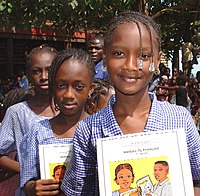
Photo from wikipedia
The comparative and international education field inherently grapples with what’s to come—policies, goals, and educational “futures” (UNESCO 2019). Yet mainstream thinking, including both optimistic planning as well as critiques, arguably… Click to show full abstract
The comparative and international education field inherently grapples with what’s to come—policies, goals, and educational “futures” (UNESCO 2019). Yet mainstream thinking, including both optimistic planning as well as critiques, arguably offers only limited and tempered rearticulations of the present circumstances. Educators and students face some inevitable and drastic shifts that will affect both schooling and the societies in which they live—for instance, the impacts of technological advancements and environmental crises. In order for us to adequately face these radical changes, perhaps our approach to thinking about educationmust be radical as well. This special section of Comparative Education Review’s book and media essay reviews offers a reimagining of ourfield, focusing on speculative and sciencefiction to understand and inform comparative and international education research, policy, and practice. In this section, reviewers cast off the mainstream ideal of objectivity that characterizes typical academic publishing and instead embrace narratives that think beyond our current condition to alternative futures, times, and spaces. Science fiction has long offered much more than entertainment through storytelling by envisioning what we might face were humanity to continue on its current trajectory. As author Charlie Jane Anders recently wrote in a Washington Post opinion piece: “we need to imagine the future in order to survive it” (2019). And the present moment spurs an urgency for this new imagining. The renewed popularity of dystopian classics including Margaret Atwood’s The Handmaid’s Tale and George Orwell’s 1984 reflects a widely understood function of science fiction: to not merely envisage what might be, but to act as a mirror and unmask the here and now (Charles 2017; Marsh 2017). The New York Times’ new series “Op-Eds from the Future” (2019) embraces this sentiment, publishing pieces by fiction writers, scientists, and philosophers, all speculating on the future—and by extension, the present— of politics, business, technology, genetics, and the environment. And while scholars of anthropology, science and technology studies, and critical theory have adopted sciencefiction as a lens throughwhich to examine their respective fields (see Freedman 2013; Jasanoff and Kim 2015; Jensen and Kemiksiz 2019), as this special section makes clear, so too can comparative
Journal Title: Comparative Education Review
Year Published: 2020
Link to full text (if available)
Share on Social Media: Sign Up to like & get
recommendations!